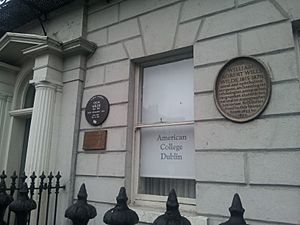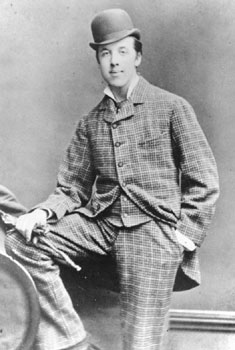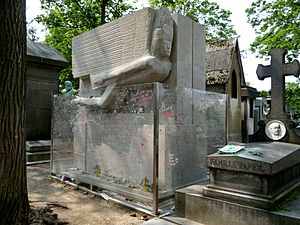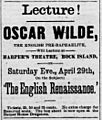Oscar Wilde facts for kids
Quick facts for kids
Oscar Wilde
|
|
|---|---|
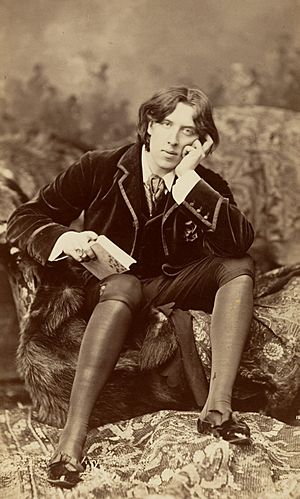
Photograph taken in 1882 by Napoleon Sarony
|
|
| Born | Oscar Fingal O'Flahertie Wills Wilde 16 October 1854 Dublin, Ireland |
| Died | 30 November 1900 (aged 46) Paris, France |
| Resting place | Père Lachaise Cemetery |
| Occupation |
|
| Language | English, French |
| Nationality | Irish |
| Education | Portora Royal School |
| Alma mater | |
| Period | Victorian era |
| Genre |
|
| Literary movement | Aestheticism |
| Notable works | |
| Spouse | |
| Children |
|
| Relatives |
|
| Signature | |
 |
|
Oscar Fingal O'Flahertie Wills Wilde (born October 16, 1854 – died November 30, 1900) was a famous Irish writer, poet, and playwright. He is best known for his only novel, The Picture of Dorian Gray, and his witty plays like The Importance of Being Earnest, An Ideal Husband, and Lady Windermere's Fan. Wilde was a very popular figure in his time, known for his clever words and unique style.
Contents
Oscar Wilde's Early Life and Family
Oscar Wilde was born in Dublin, Ireland. He was the second of three children. His mother, Jane Wilde, was a writer and a strong supporter of Irish independence. She wrote poetry and was known for her literary work.
Oscar's father, Sir William Wilde, was a leading surgeon in Ireland, specializing in ear and eye care. He was also a kind person who helped the poor. He wrote books about Irish history and folk stories.
Oscar's Education at Home and School
Until he was nine, Oscar was taught at home. He learned French from his nursemaid and German from his governess. This early learning helped him with languages.
Later, he joined his older brother Willie at Portora Royal School in Enniskillen. He went to this school from 1864 to 1871. Oscar was seen as very smart by his classmates. They said he could read very quickly and remember a lot of information. He was especially good at Classics, which is the study of ancient Greek and Roman language and culture. He won many awards for his ability to translate Greek and Latin texts.
University Studies: A Bright Student
Oscar continued his studies at Trinity College, Dublin. He was an excellent student, often coming first in his class. He won a special scholarship and the Berkeley Gold Medal in Greek, which was the highest award at the university.
His success at Trinity College helped him win another scholarship to Magdalen College, Oxford. There, he studied "Greats," which included classical literature, philosophy, and ancient history.
Wilde's Unique Style at Oxford
At Oxford, Oscar Wilde became known for his unique style and his involvement in the Aesthetic movement. This movement focused on the idea of "art for art's sake," meaning that art should be beautiful and not necessarily have a moral message. Wilde wore his hair long and decorated his room with beautiful objects like peacock feathers and sunflowers. He stood out from other students.
In 1878, he won a prize for his poem "Ravenna". He graduated from Oxford with top honors in his studies.
Oscar Wilde's Literary Career
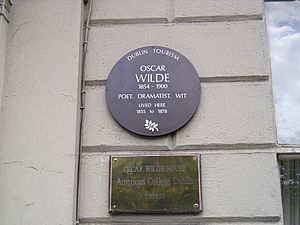
After university, Wilde moved to London and worked as a journalist. He quickly became famous for his sharp wit, his fancy clothes, and his brilliant conversations. He was one of the most well-known people in London at the time.
His novel, The Picture of Dorian Gray, brought him widespread recognition. After this, he started writing plays. He wrote Salomé in French in 1891. Even though it was not allowed to be performed in England at first, Wilde wrote four popular comedies in the early 1890s. These plays made him one of the most successful playwrights in London.
His Most Famous Play
At the peak of his fame, Oscar Wilde wrote his most famous play, The Importance of Being Earnest. It was first performed on February 14, 1895, at the St. James's Theatre in London. This play is still loved today for its clever humor and witty dialogue.
Oscar Wilde's Final Resting Place
Oscar Wilde was first buried in a cemetery outside Paris. In 1909, his remains were moved to Père Lachaise Cemetery inside the city. His tomb was designed by Sir Jacob Epstein and is a famous landmark.
Honoring Oscar Wilde's Legacy
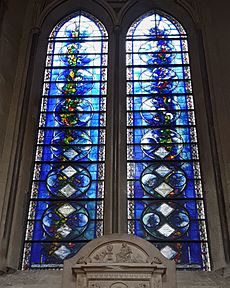
On February 14, 1995, Oscar Wilde was honored with a beautiful stained-glass window in Poets' Corner at Westminster Abbey in London. This special place is where many famous writers are remembered. His grandson, Merlin Holland, unveiled the memorial.
Oscar Wilde's Personal Life
Oscar Wilde was married to Constance Lloyd. They had two children together.
Famous Quotations by Oscar Wilde
Oscar Wilde was known for his clever and memorable sayings. Here are a few:
- I have the simplest tastes. I am always satisfied with the best.
- A thing is not necessarily true because a man dies for it.
- A poet can survive everything but a misprint.
- Be yourself, everyone else is taken.
Oscar Wilde's Famous Books and Plays
Prose Works
- The Canterville Ghost (1887)
- The Happy Prince and Other Stories (1888)
- The Picture of Dorian Gray (1891)
- A House of Pomegranates (1891)
- De Profundis (1905)
Plays
- Lady Windermere's Fan (1892)
- A Woman of No Importance (1893)
- Salomé (French version) (1893)
- An Ideal Husband (1895)
- The Importance of Being Earnest (1895)
Images for kids
-
Photograph by Elliott & Fry of Baker Street, London, 1881
-
1881 caricature in Punch, the caption reads: "O.W.", "Oh, I eel just as happy as a bright sunflower, Lays of Christy Minstrelsy, "Æsthete of Æsthetes!/What's in a name!/The Poet is Wilde/But his poetry's tame."
-
No. 34 Tite Street, Chelsea, the Wilde family home from 1884 to his arrest in 1895. In Wilde's time this was No. 16 – the houses have been renumbered.
-
Wilde by W. & D. Downey of Ebury Street, London, 1889
-
Plaque commemorating the dinner between Wilde, Arthur Conan Doyle and the publisher of Lippincott's Monthly Magazine on 30 August 1889 at the Langham Hotel, London, that led to Wilde writing The Picture of Dorian Gray
-
Lake Windermere in northern England where Wilde began working on his first hit play, Lady Windermere's Fan (1892), during a summer visit in 1891.
-
Oscar Wilde's visiting card after his release from gaol
See also
 In Spanish: Oscar Wilde para niños
In Spanish: Oscar Wilde para niños
 | Precious Adams |
 | Lauren Anderson |
 | Janet Collins |


